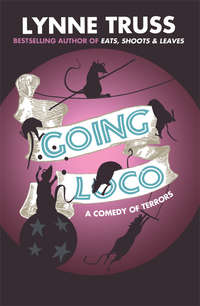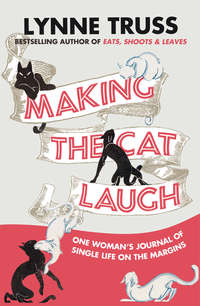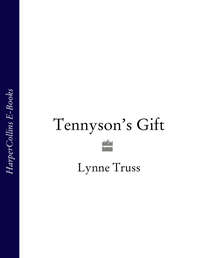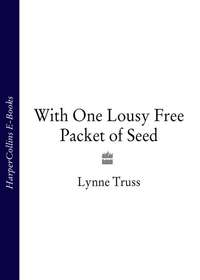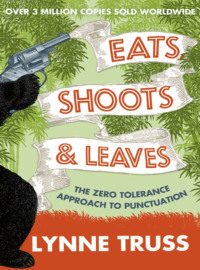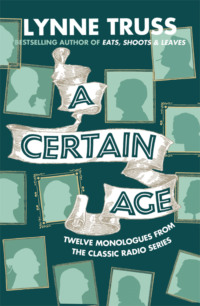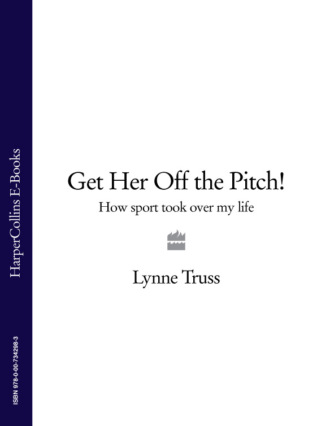
Полная версия
Get Her Off the Pitch!: How Sport Took Over My Life

GET HER OFF THE PITCH!
How Sport Took Over My Life
LYNNE TRUSS

To David Chappell and Keith Blackmore, who sent me to football.
You bastards.
Table of Contents
Cover Page
Title Page
Dedication
Boxing and the Thrill of the Unknown
The Fight
Football and the Thrill of Knowing a Little Bit
The Match
Tennis and the Value of Sports Writing
The Player
Golf and the Basic Misogyny of Sport
The Sunday
Miscellaneous Sports, Travel, and All the Misleading Bollocks I Had to Put Up With
Cricket
Football Again and the Necessity of Weeping
The End of the Affair
By the same author
Copyright
About the Publisher
Boxing and the Thrill of the Unknown
Looking back on events some years later, I remember the moment quite clearly. The place was Madison Square Garden in New York City, and the occasion was a press conference, just a couple of days before the fight between Evander Holyfield and Lennox Lewis on Saturday March 13, 1999. Boxing promoter Don King had been bellowing at us for about an hour already, and the air was hanging heavy. Two very big bored boxers sat awkwardly, in clothes, with their heads in their hands; those of us who had tape recorders had long since switched them off; I was doodling a large and complicated doodle with a lot of dense cross-hatching. And then King announced, ‘And this fight is dedicated to women!’ And for a second, I reacted. I flipped a page in my notebook. ‘Dedicated to women? That’s quite interesting!’ I thought - and then, just as quickly, I kicked myself for being suckered like a patsy. How shaming. I prayed that no one had noticed. At this point, I had been in the world of international heavyweight boxing for three whole days, which was quite long enough to know the first rule of the business, which is never to allow anything said by Don King actually to penetrate your brain.
Two or three weeks before this, I would have asked without embarrassment, ‘Who is this Don King, then; and what does he do?’ but the assimilation of sudden and improbable expertise was the story of my life in those days. ‘You will be covering the Holyfield-Lewis fight at Madison Square Garden on March 13,’ they would tell me, those amusing sports-editor bosses at The Times in London; and, luckily for me, they didn’t expect much by way of an intelligent reply. Sporting knowledge was not what I’d been hired for by the Times sports desk; just a cheerful nature, an open mind, a clean driving licence, and an idiot willingness to deliver 900 words on deadline from any live sporting event, including those I didn’t remotely understand. ‘And this Holyfield-Lewis thing will be quite a big deal, I suppose?’ I might ask; and they would say, ‘Yes, Lynne, it’s a very big deal.’ I would momentarily consider mentioning that I did know one rather interesting fact about the American fighter Evander Holyfield - that the top of his ear had been bitten off, during a fight, by Mike Tyson - but then I’d think better of it. They could never disguise their pity when I said pathetic teacher’s-pet things like, ‘Ooh, Wembley’s the one with big white towers, isn’t it?’ or ‘Thierry Henry? I believe I’m right in thinking he’s French.’ So they would tell me I was going to this mysterious fight, and it was best policy just to say, ‘Well, you’re the boss,’ and start to arrange (in order of importance): a cat-feeding rota for my absence; a couple of opportunistic Broadway theatre outings; and a bit of basic remedial homework in the general subject area of boxing, to help me appreciate, simultaneously, both the significance of the event I had let myself in for, and the great bottomless chasm of my own ignorance.
I always really enjoyed the homework. In the week before travelling to Madison Square Garden in March 1999 for this heavyweight ‘unification’ title fight, I bought some serious books on boxing to read on the flight ( Joyce Carol Oates, Donald McRae, Norman Mailer), plus the video of When We Were Kings. This famous documentary movie deals with the 1974 Muhammad Ali-George Foreman fight in Zaire known as ‘The Rumble in the Jungle’, and I have to say I watched it one dark February evening at home in Brighton with considerable interest. What a great film. For one thing, it was terribly well put together, with all those twinkle-eyed ringside-seat recollections from Norman Mailer and George Plimpton. And for another - well, Ali actually won the fight, and I really didn’t see that coming. Yes, alone among all the millions of people who have watched that terrific account of a (then) 25-year-old iconic sporting occasion of legendary proportions, I hadn’t the faintest idea of the outcome. Ali leaned back on the ropes for ages, you see, allowing the more powerful Foreman to exhaust himself with huge, heavy, battering-ram punches, and then - all of a sudden, in the eighth round - sprang into elastic action and knocked Foreman out with a combination of deft, lightning blows. Well, good heavens, I thought, as I rewound the tape and munched a biscuit. More people really ought to take an interest in boxing.
And now, after just three days in the orbit of Don King, I was already sick of him. What an appalling man to be with in a confined space. ‘Do you know What?’ he yelled at me, as I bravely held up my tape recorder in front of him, one afternoon when the Garden was otherwise oddly quiet, and a Times colleague had wickedly put me up to stopping Don King and asking him a question. An enormous, portly, grizzled African-American flashing an oblong of diamonds on his finger the size of a mousemat, King is famous for having the vertical hairstyle of a man freshly released from a wind tunnel, for his beloved catch-phrase ‘Only in America!’, and for speaking at a volume that causes small buildings to fall over and helicopter pilots several miles away to wrestle with the controls. ‘Do you know WHAT?’ he yelled. ‘This Saturday night they are calling a moratorium in KOSOVO and BOSNIA!’ ‘Really? Are you sure? Wouldn’t that be quite difficult?’ I wanted to say, but there wasn’t a chance. ‘I said to them,’ he yelled, ‘they got to call a MORATORIUM and watch the King’s Crowning GLORY! NATO couldn’t do it, but DON KING can do it! This way, if they DIE, they can die happy because they saw the fight of the millennium, and if they SURVIVE, they’ll have SOMETHING TO TELL THEIR KIDS.
‘Remember CYRANO DE BERGERAC?’ he went on, without a pause for me to interrogate fully the concept of dying happy in Bosnia. ‘Crossed enemy lines just to mail a letter to ROXANNE?’ I nodded, confused, wondering what Cyrano de Bergerac had to do with Holyfield or Lewis, or indeed the war in the former Yugoslavia. The answer, intriguingly, was nothing. ‘We had the Boston Tea Party in 1776, now we’ve got the FIGHT OF THE MILLENNIUM in 1999.’ King evidently acquired all his scatter-gun erudition in a prison library, after being convicted of kicking a man to death - but tragically forgot afterwards all that other stuff they teach you in libraries about the importance of keeping your voice down.
‘I went out SINGLE-HANDED and got this fight; I slaughtered the wild boar and dragged it HOME and drew its fangs and TORE ITS HORNS OUT, and I thank Britain for the Marquess of Queensberry who brought ORDER OUT OF CHAOS.’ I wondered if I should ask a follow-up question. After all, I’d only said, ‘So, Mr King, are many people signing up for the pay-per-view?’ But I didn’t get the chance. ‘Will you do a little piece for us now?’ piped up a telly producer, who had been waiting to one side for my one-to-one to finish. ‘I’ll do a BIG piece for you now,’ said King, and just swivelled on the spot and started yelling in another direction.
All this occurred in my third year as a sports writer, and I apologise for starting, so bewilderingly, in the middle, but, as I hope this book will make clear, although I did the job for four years altogether, I felt bewildered and sort-of in the middle virtually all the time. I was permanently on an almost-vertical learning curve, clinging for life. For four years, week after week, at football stadiums, golf courses and race tracks, I would gaze around me - equipped with binoculars, pencil, notebook and enigmatic smile - and think, afresh, ‘Lynne, what the fuck are you doing here?’ Unfortunately, there was no point asking anyone else this question, because they couldn’t tell me. My colleagues in the press box, notably, were actually asking themselves the same question - i.e., ‘What the fuck is she doing here?’ - while inwardly snarling at the fact that this know-nothing middle-aged female (who sat chuckling over her laptop when she wasn’t complaining about the elbow-room or fainting for want of a half-time cheese roll) regularly deprived proper sports writers of prime space in a newspaper. I could genuinely sympathise with how irritating this was; but I did feel they should have been clever enough to work out that it wasn’t my fault, and that I’d never asked for this job; it had been someone else’s idea. However, I couldn’t deny how it looked. I had a very large byline picture featuring myself with a Louisville Slugger baseball bat. I sometimes wrote the whole back page of The Times. I had been nominated for Sports Writer of the Year. For someone who likes, above all, to be popular with colleagues and not attract undue disdain, I might as well have slit my own throat.
The irony was, I had enormous respect for these chaps who were my colleagues. Sports writers not only take sport seriously; they also know all about it without ever seeming to check a fact, read a book, or even study unfolding events too closely. And they do it, valiantly, for years and years, and years, and years. ‘I’ve recently worked out that, adding up the days, I’ve spent a full year of my life watching fights in Las Vegas,’ one chap told me on this trip to the Garden. While they would rather die than complain about the intolerable amounts of discomfort, loneliness, pressure and aggravation they have to put up with, I do know how bad it is, and I salute them for their fortitude. My own response to the intense you-can’t-park-here-and-you-can’t-park-there-either aggravation of the sports writer’s life never really fitted with anyone else’s, though, I noticed. I tended to get worked up about how badly things were organised; the other sports writers, on the other hand, were inured to bad organisation, and simply looked after themselves. If there was no electricity in the press box (as when the Millennium Stadium opened for business in Cardiff, for example), I’d be dashing about raising the alarm, while the chaps would each discover a dead socket and then, shrugging, set about making makeshift arrangements on an individual, self-serving basis. I never got the hang of this I’m-all-right-Jack attitude. If there was no information about where to park during a football tournament, I’d berate the organisers - but when I appealed to my colleagues for back-up, they would be mystified by my passion, and a bit embarrassed by it. ‘I found a place round the back,’ they’d say, annoyingly, as if that solved anything.
Naturally, a world heavyweight title bout in America brought out the most macho of their macho qualities; but in interesting and quite unpredictable ways. That week in New York was notable mainly for an unusual pack mentality in some of the alpha-group ‘chief ’ British sports writers: wherever the chap from the Sun went (in a broad-shouldered camel coat, like a gangster), so followed half a dozen of our top, white-haired veterans, in a tight formation, half a step behind. These quasi-feudal processions, with the tabloid man at the front and the ‘qualities’ bobbing along in his wake, were quite strange to observe, especially as the chap from the Sun was actually in trouble with the Lewis camp for asking the intriguingly androgynous Lennox in an exclusive interview whether he was gay - which the Sun editorial staff larkily chose to print alongside an outrageous appeal for any former girlfriends of Lewis to identify themselves, spill the beans, and thereby put an end to speculation.
So it is fair to say I was an anomaly among sports writers, which was both my personal tragedy and my writerly advantage. All the other journalists attending Madison Square Garden for the Holyfield-Lewis fight had known for twenty-five years that Muhammad Ali beat George Foreman in Zaire back in 1974. They would be disgusted (though not a bit surprised) to learn that it was quite fresh news to me. Knowing this made me feel both good and bad at the same time. I understood that I was thoroughly deserving of my colleagues’ contempt, yet I didn’t really care, because - on the white-knuckle ride of my learning curve - I was patently having a much more interesting experience than they were.
What was this fight? Why was it such a big deal? Well, what was clear from the outset was that many hopes were being pinned on it as a once-and-for-all kind of confrontation, and that this was, in any case, the highest level of fight you could hope to see. People in Bosnia might not genuinely be observing a ceasefire for the sake of it, but in boxing terms it was huge, because (in the words of the excellent British sports writer James Lawton) it was ‘transparently legitimate’. There was no contender involved, since both men were title-holders, the proud possessors of belts that tragically don’t go with anything, but nevertheless represent the limit of achievement in the field. Someone would emerge from this fight the ‘undisputed’ champion of the world, and for Lennox Lewis - Olympic gold medallist with Jamaican/Canadian background but British nationality - here was his chance, at last, to refute his critics and prove himself. Significantly, he would do this largely on his own terms. The exquisitely dreadlocked Lewis was evidently a man of quiet intelligence, with excellent strategic skills, and a powerful self-preservation instinct. He was famous for his enjoyment of chess, which admittedly sometimes infuriated his trainer (‘I hate that chess shit,’ the trainer told the press. ‘People think it’s a joke with me but it’s not. I’d like to take that chess set and burn the damn thing’). But if his sleepy demeanour and unconventional boxing-clever intellectual qualities had sometimes made him a frustrating fighter to watch (‘Biff him, Lennox! You’re twice his size, for God’s sake!’), they had served him very well in other ways. Specifically, they had kept him, against all the odds, financially beyond the reach of Don King.
When I say I knew nothing about boxing before the Holyfield-Lewis summons, I mean that I knew nothing about real boxing, and had never wanted to. Like many a sensitive soul, I had a natural aversion to the whole idea of people suffering irreversible brain damage for the bloodlusting entertainment of others. This aversion was built, however, on information contained in any number of acclaimed and supposedly realistic boxing movies, in which it is made quite clear that boxing - beyond anything known in other organised sports - stinks to high heaven of corruption, criminality and playing Joe Public for a mug. Fights are fixed; managers are hoodlums; mobsters with flickknives climb into the shower with the patsy who refused to go down in the third; contender wannabes cop a one-way ticket to Palookaville. There is rarely a happy ending. Films like Golden Boy (based on a play by Clifford Odets), The Harder They Fall (based on a novel by Budd Schulberg) or Fat City (based on a novel by Leonard Gardner) depict the sport of boxing pretty starkly as a system that thrives on individual greatness but also consumes and destroys all things noble as a matter of course. In less grandiose terms, a strong, half-naked man stands alone in the ring, taking the blows, while a bunch of venal weaklings in snazzy hats pocket all his dough and then sell his broken body down the river.
Compromise always wins over integrity in this eternal tragedy. In these movies, fighters never get the bouts they deserve, despite begging for shots at the title, because it serves no one else’s skulduggery to set them up. They are often obliged to take strategic dives - and sometimes they boo-hoo afterwards at the ignominy of it, like Jake LaMotta (Robert De Niro) in Raging Bull, whom it is still incredibly hard to feel sorry for, incidentally, because he’s such a git. Finally, but most important of all, these traditional movie boxers are completely dumb about money - as confirmed by their regular, fruitless cry, ‘Give me my money.’ ‘I didn’t fight for under a thousand for five years,’ boasts a boxer in the original play of Golden Boy. ‘I got a thousand bucks tonight, don’t I?’ His manager, reading a paper, looks up and says no, actually tonight he got twelve hundred. The fighter jumps to his feet, livid. ‘What? I oughta bust your nose. How many times do I have to say I don’t fight for under one thousand bucks?’ The manager shrugs. ‘Okay, you’ll get your thousand,’ he agrees.
What the movies don’t tend to deal with (because it’s so boring) is boxing’s system of administration, which is so byzantine and preposterous that no one outside has a clue how to penetrate it, let alone challenge or dismantle it. But if you already have a suspicious nature and a sceptical attitude to boxing based on prolonged movie-watching, you can’t hear about the WBO, IBO, IBF, WBU, et cetera without narrowing your eyes and making ironical harrumphing noises. The World Boxing Council, you see, has nothing to do with the World Boxing Association besides two shared initials; meanwhile there’s the International Boxing Federation, the World Boxing Organisation, the World Boxing Union, the International Boxing Organisation, the World Boxing Federation, the International Boxing Council, and the International Boxing Association. In other words, if you can ingeniously contrive any original three-word combination of this limited range of nouns and adjectives, and can afford a big round bit of metal with some leather attached, you can set up your own legitimate boxing organisation in your downstairs lavatory for the price of a packet of stamps. All of these organisations are in the belt business, and at the time of the Holyfield-Lewis fight in 1999, Holyfield was ibf and wba champion; Lewis was wbc. Or, quite honestly, it might have been the other way round.
Either way, the one thing I understood about this fight from the moment I arrived in New York was that toilers in the foetid world of boxing were hoping for a breath of fresh air to blow through the whole sport this coming weekend. Boxing’s reputation was as low as it could get, and commentators had long since run out of synonyms for ‘stink’. A recent fight arranged for Lewis had been against the American Oliver McCall - a man who may have looked, on paper, like a worthy opponent, since he had once knocked Lewis out at the Wembley Arena (in September 1994), but who was in such a bad mental state on the night of the second fight (in January 1997) that he was in tears in the ring. It was ghastly, apparently. All the commentators who saw this fight quickly ran out of synonyms for ‘sickened’. A recovering crack addict, McCall wandered around the ring avoiding Lewis, crying, talking to himself, and having a public nervous breakdown. Lewis held back, cautiously offering the occasional jab, like a cat testing a dead mouse. It was a confusing situation for a boxer trained to put himself on the line. To adapt the famous line from Raging Bull (‘I didn’t know whether to fuck him or fight him’), on this occasion, Lewis didn’t know whether to fight McCall or offer him a nice cup of cocoa.
But now, come Saturday night, by a Herculean effort, a diverted river was going to gush through the Garden and wash all the blood off the ropes. Holyfield-Lewis was a very big deal. In fact, I was beginning to realise that nothing in the world - certainly not Bosnia - was as important as this contrived fight, for eight-figure money, between two men who (as yet) I didn’t even know very much about. As I sat in my tiny hotel room in the evenings - listening to the exciting parp-parp of the wintry midtown traffic; leafing avidly through boxing magazines; pondering Norman Mailer’s theory that boxing, like chess, is all about ‘control of the centre’ (how true); and occasionally jumping up to practise a combination of right to the kidney, followed by uppercut and left hook (quite difficult without falling over) - I started to share the palpable sense of destiny.
My first sight of Evander Holyfield was at a grim gym in lower Manhattan. It was a raw, freezing day, and I shared a cab with the chap from the Telegraph, who was staying at the same mid-town hotel (The Paramount). The coincidence of our staying at the same hotel had really bucked me up, incidentally, because it seemed to me, during my four years in the business, that I was forever comparing travel arrangements with this particular chap, and coming out the loser by a knockout in the first round. ‘Where are you staying, Lynne?’ he would ask, when we met (say) at one of the earlier matches of the World Cup in Paris in 1998, and I would attempt to make light of the appalling truth. ‘Well, it’s quite interesting,’ I’d say. ‘They’ve put me in a hotel that costs a mere £24 a night - which must have taken quite some doing, don’t you think? My room stinks of drains, doesn’t have a television or a lavatory, and the phone has a big dial on it and is bolted to the wall, so I can’t plug in my laptop. But heigh ho, what can you do? It’s incredibly handy for the Musée d’Orsay, and I honestly haven’t been attacked yet walking back up that dark street from the Metro dragging my big heavy laptop after midnight.’ Then, with a huge generosity of spirit, I would ask, ‘Where are you staying, then, Paul?’ And it would always be somewhere stylish, bright, central, fully equipped, expensive, modem-friendly and (all-importantly) served door-to-door by media buses, that would make me want to saw my own head off.
Discovering that Paul and I were on the same flight to New York from Heathrow, therefore, we had gone through the usual routine on the plane - except, for once, I asked first. ‘Oh, I’m staying at that Philippe Starck place off Times Square with all the funky furniture and the low lighting,’ he said. ‘Oh really?’ I squeaked, trying not to betray my despair. ‘I’m at some dump called The Paramount.’ And for heaven’s sake, for once we were in the same place. It was a miracle. For once in my life, I was probably going to get a room with some basic bathroom fittings. Of course, when we arrived, Paul got himself upgraded to a better class of room immediately, while I had to argue for a couple of hours at check-in because the Times travel people had failed to confirm the reservation (this always happened). But still, to be in the same hotel in New York as the chap from the Telegraph for a whole week was really, really something, and I still feel quite proud.
Back at Holyfield’s gym, I was keen to get a sight of a real boxer by now - which was a shame, because when we arrived (at the appointed time) real boxers were nowhere to be seen. It was a bleak spot, this gym: a high-ceilinged, whitewashed-brick kind of underground space filled with punch-bags and stale air, not to mention huddles of impatient hacks sipping take-out coffees. There were a couple of large murals of famous boxers on the side wall - they turned out to be Joe Louis and Jack Dempsey, so I’m glad I didn’t guess. And as we all hung about, waiting to be summoned through a small door in the wall (like something from Alice) to an inner, warren-like place where Holyfield was said to be sparring in private, I think I had a bit of an epiphany. Making a puny fist, I tapped a punch-bag (which didn’t move), and someone told me the interesting fact that Mike Tyson filled his punchbags with water, so that hitting them was more like hitting the human body. I quipped, ‘Does he cover them in human skin, too?’ and then felt ashamed for being so flippant - especially as no one laughed.


